Screening Iranian Movies In Israel Is A Redline For Tehran
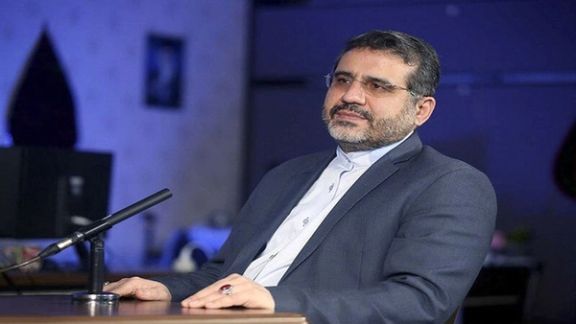
Iran’s Minister of Culture and Islamic Guidance said Wednesday that screening Iranian movies in Israel is forbidden and should not be violated.

Iran’s Minister of Culture and Islamic Guidance said Wednesday that screening Iranian movies in Israel is forbidden and should not be violated.
“We have told all those who are working inside Iran that film screening in Israel is a redline for the Islamic Republic and we will certainly punish those who screen their films there,” Mohammad-Mehdi Esmaili said.
“We have no tolerance” regarding this issue, he said, warning all producers and filmmakers to be careful that such screenings do not happen.
He also thanked producers and filmmakers who stopped the screening of their films “in the occupied territories” as soon as they found out that their sponsors plan to release their movies there.
Esmaili did not elaborate on how the filmmakers are going to stop international distribution companies – who are actually responsible for marketing a film – from screening the movies in Israel.
In the latest case -- at the Jerusalem Film Festival that was held in July -- several films by Iranian directors such as Asghar Farhadi, Paris-based Mitra Farahani and Ali Abbasi, whose movie Holy Spider won the best actress award at 2022 Cannes Film Festival -- were screened, but the film "Tomorrow" by Ali Asgari was withdrawn from the festival after pressure from the Islamic Republic’s authorities.
The Islamic Republic does not recognize Israel and even forbids its athletes from facing Israeli competitors in international sports, making numerous Iranian champions leave the country or defect to other national teams.

The father of one of the victims of the downing of Flight PS752, which was hit by Iran in 2020, plans to walk to Canada’s capital to reiterate calls to designate IRGC as a terrorist outfit.
Mehrzad Zarei, the father of Arad Zarei, will embark on his symbolic 400-kilometer march on Wednesday noon local time after a press conference at his son's grave in Richmond Hill, Ontario, and will go to Ottawa to personally deliver his protest letter to Prime Minister Justin Trudeau.
Criticizing a lack of justice for the victims of the incident, he intends to ask Trudeau why the government does not blacklist Iran’s Revolutionary Guard as a terrorist organization, as was stipulated by a Canadian parliament's resolution in 2018.
In May 2021, in a case -- titled Zarei et al vs Islamic Republic of Iran et al – some family members filed a civil lawsuit against Iran and senior officials they believe were to blame for the incident. The Ontario Court ruled that the downing of the plane was an intentional act of terrorism and on December 31, 2021, awarded compensation to be shared by the estates of the six victims.
Earlier this year in June, Canada's international human rights parliamentary subcommittee criticized the government's “passive” approach toward Iran’s widespread human rights abuses in a House of Commons subcommittee meeting attended by several political and human rights activists – including the spokesman of the Association of Victims' Families, Hamed Esmaeilion.
The airliner was shot down by two air-defense missiles fired by the IRGC on January 8, 2020, as it took off from Tehran’s Imam Khomeini International Airport. Only hours earlier, the IRGC had fired more than a dozen missiles at Iraqi bases hosting US and coalition troops in retaliation for the killing of the IRGC Qods Force Commander Ghasem Soleimani who was killed in Baghdad by a US drone strike just five days earlier.
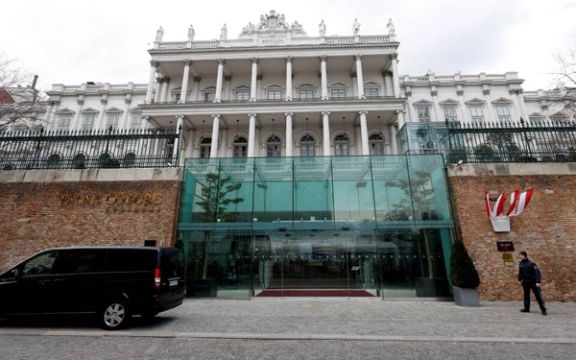
As European officials submitted a final take-it-or-leave-it proposal to restore the Iran nuclear deal, reports say Israeli officials believe Iran is unlikely to agree to a return to the 2015 pact.
Anonymous sources told Hebrew media on Tuesday that Israel is convinced Tehran will not accept the latest text Western negotiators have agreed upon as diplomats returned home from Vienna following the most recent round of talks.
According to Haaretz, Iran’s Supreme Leader Ali Khamenei will block the move as Europe’s recent confidence in renewed confidence in the talks is just ‘manufactured optimism’ designed to pressure Tehran.
“There was momentary optimism, but very quickly it turned out to be contrived optimism meant to pressure the Iranians into making a decision, hopefully accepting the text as it was presented,” the officials said.
“There wasn’t any strategic shift in terms of the Iranians. They don’t want to accept this agreement, and they will struggle to accept anything that isn’t a significant improvement of the original nuclear deal,” one Israeli official argued.
The new text includes guarantees that foreign companies will be able to invest in Iran or operate there once sanctions are lifted, without fearing the repercussions of any party withdrawing from the deal, as the United States did in 2018 under President Donald Trump, but Tehran demanded more drastic concessions outside the scope of the original agreement, including over an International Atomic Energy Agency probe into undeclared nuclear material found in the country.

Russia not only launched a satellite for Iran this week, but its personnel were also reportedly sent to train on Iranian military drones to use in Ukraine.
Since the announcement of the impending satellite launch, Iranian officials were trumpeting it as their satellite, symbolizing their scientific achievement, but after it was sent into orbit the Russian embassy put out a statement on Instagram saying its companies had built and launched it.
The Islamic Republic, which has openly supported Russia’s invasion of Ukraine, has also been trumpeting the importance of strategic and military ties with Moscow. US officials have been warning since mid-July that Russia is preparing to buy military drones from Iran to use in the war. Iranian officials never clearly denied the accusation.
CNN reported on Wednesday that US officials believe Russians are training in Iran to familiarize themselves with the Iranian drones. This is the second time US officials speak to the media about Russian personnel being in Iran either to review or train on the drones. US National Security Adviser Jake Sullivan said in mid-July that Russian officers visited a drone base in Iran’s Kashan, hinting at possible training for operating the drones.
The director of US Central Intelligence Agency, William Burns also said in July, “It’s true that the Russians are reaching out to the Iranians to try to acquire armed drones,” Bloomberg reported.
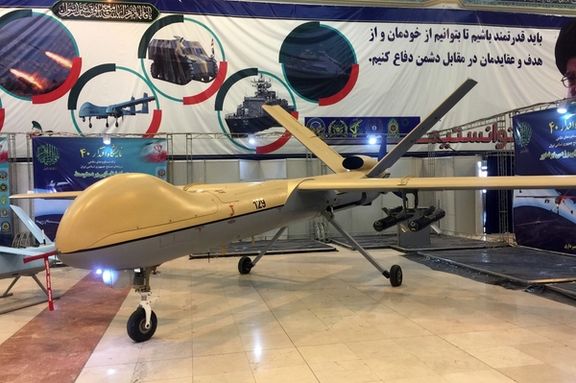
An adviser to the Ukrainian president told Iran International on July 25 that it won’t be a surprise is Tehran provides military drones to Moscow.
“We have to view it in that perspective that Iran and Russia are allies in this conflict. In Ukraine, we obviously have no illusions about this. So, we are obviously very aware of what's going on, and we're going to be very careful about our relationship with Iran and what we hear from Iranian authorities when it comes to Ukraine,” Alexander Rodnyansky told Iran International.
An unconfirmed report quoting a Kyiv official last week said that Russia was already using Iranian drones in Ukraine.
US–based think tank Institute for the Study of War quoted an advisor to the Ukrainian President’s Office, Oleksiy Arestovych, as saying on Friday that Iran handed 46 drones over to Russia and that the Ukrainian government has already noted the use of these drones in combat in Ukraine.
Another embarrassing aspect of the satellite deal were media reports last week that Russia will control the Iranian satellite for a while and possibly use it for the war in Ukraine. Iranian officials responded to this on August 7, categorically stating that they will be in full control from Iran.
Many politicians and former officials who are loyal to the Islamic Republic have repeatedly warned in recent months not to tilt the country’s foreign policy toward Russia and China and try to resolve Iran’s nuclear dispute with the West. But the hardliners in Tehran have so far rejected this advice, refusing to accept a compromise deal worked out with European Union mediation in Vienna after 16 months of negotiations.
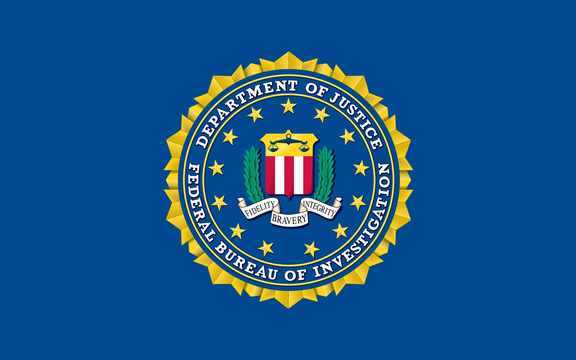
The Federal Bureau of Investigation says the Iranian regime and “its terrorist partners” aren’t just a threat to the Middle East, but also a critical risk for the United States.
In a number of tweets on Monday, the FBI said Iran and its proxy groups “don't just endanger the Middle East -- they also put Americans, US national security, and our country's critical infrastructure at risk.”
Sharing a link to a page on its website about how it is fighting back against the Iranian threat, the bureau added that the risk by the Islamic Republic is not theoretical. “Through intel and law enforcement partnerships, the FBI has countered an array of threats from Iran's government -- such as attempted terrorist attacks and kidnappings, espionage and foreign influence ops, and cyberattacks.”
Reiterating its commitment to identifying and disrupting all Iranian intelligence and military operations that threaten the Americans, the FBI said, “We'll use every tool and authority at our disposal to investigate crimes that Iran’s government and terrorist partners direct.”
“The Iranian regime has used repressive tactics in its wrongful detention of Americans in Iran on unsubstantiated criminal charges. The Iranian regime has also exported its repression through its harassment and lethal targeting of Iranian dissidents worldwide, including Americans living in the United States.”
Earlier in August, US National Security Advisor Jake Sullivan expressed concerns over the safety of Iranian women’s rights activist Masih Alinejad following the arrest of a man with an assault rifle outside her New York home.
Alinejad, who was also the target of an international kidnapping plot orchestrated by Iran’s intelligence network last year, has promoted videos of women protesting Iran's compulsory Islamic dress code to her millions of social media followers.
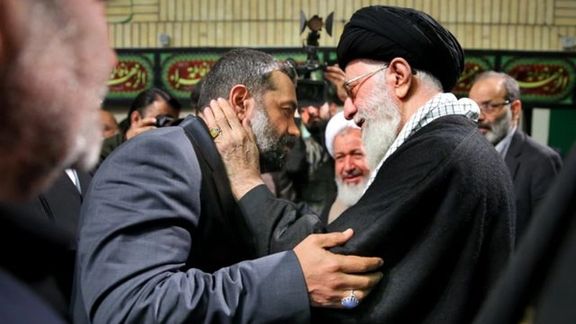
In an odd move unprecedented in the history of Iranian press, the government-owned newspaper, Iran, has published a 16-page special supplement about a eulogist.
The subject of the supplement, Mahmoud Karimi, is one of favorite 'maddahs' or eulogists of Iran’s Supreme Leader Ali Khamenei, who during three decades of his leadership, has given a special status to religious eulogists. A status some grand ayatollahs sometimes covet.
Under Khamenei, maddahs who used to sing tragic songs in graveyards for families of the deceased or chant tragic stories during the mourning month of Muharram to earn a living, are now the Islamic Republic’s political theoreticians, influential figures in political groups and government offices. They can put anybody’s business on fast track, albeit against a fee, using their influence as individuals close to Khamenei.
Even at election times, associations of eulogists conduct propaganda for candidates for a fee. The closer the eulogist is to Khamenei, the higher are his fees and of course his influence. Karimi enjoying that status is one of the richest and most famous eulogists of Tehran.
In 2005, a hundred maddahs signed a petition calling on the nation to vote for Mahmoud Ahmadinejad for president. Before that, in 1997 Ali Akbar Nategh Nouri used eulogists to help his campaign.
A maddah who can make Khamenei weep during the Muharram mourning ceremonies can do anything during the year.
According to Rouydad24 website which featured a long report on the status and activities of eulogists, they are highly active and terribly busy during the months of Muharram and Safar on the lunar calendar which coincide with the death anniversary of key Shiite saints.
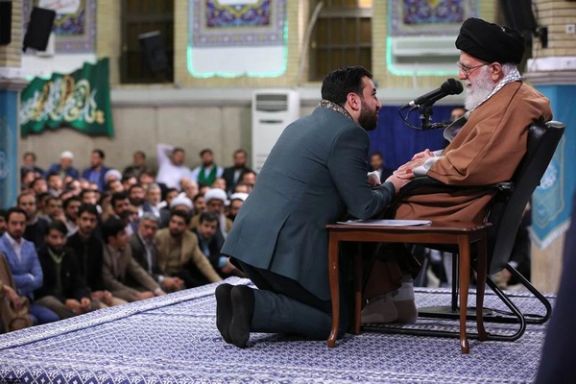
Islamic Iran’s first leader, Ayatollah Ruhollah Khomeini once said, “Islam (Shiism) is alive thanks to and because of these two months.” But eulogists do not just eulogize. They organize the Ashura and Arbaeen religious marches in the streets of Tehran and throughout the neighboring country of Iraq where they helped establish the Islamic Republic’s long reach.
Meanwhile, maddahs have been seen during protests since 2009 helping the IRGC to crack down on protesters. Mahmoud Karimi was one of them particularly in 2009. He is also famous for taking advantage of his position. Media reports in the 2010s include a story about him shooting at a driver who wanted to get past his car in one of Tehran’s tunnels.
Eulogists’ associations in downtown Tehran including the Islamic Coalition Party and the Mahdiyeh are famous for their political influence in hardliner circles and for bossing around state officials. Mansour Arazi, a renowned maddah is famous for using swear words against former Presidents Mahmoud Ahmadinejad and Hassan Rouhani when he fell out with them, or when they fell out with Khamenei.
The 16-page supplement published by Iran newspaper on the first day of Muharram, was full of praise for Karimi. A singer who is not even the poet of what he sings. He is famous for copying, or as Iranian musicians say “covering” Bollywood movie songs with substandard Persian poetry. Sometimes, his eulogies have turned out to be controversial as he “covered” the famous songs of Los Angeles-based Iranian pop singers and moving to the beats of the music.
The extensive supplement includes an interview with Karimi’s mother as part of the publicity stunt. Meanwhile, the supplement quoted ultra conservative politician Saeed Jalili, the arch enemy of an agreement with the United States, as saying, “Principlists [ultraconservatives] have failed to value their friends. This supplement is a token of appreciation for one of their friends.”
Karimi is known for his verbal attacks on former Foreign Minister Javad Zarif, an advocate of a nuclear deal with the United States.
Most maddahs are rich, thanks to their ties with men of power. In return, they protect politicians against rivals, but their main job is organizing and mobilizing mobs to attack opponents of hardliners or protesters perceived as threats to the regime’s core.